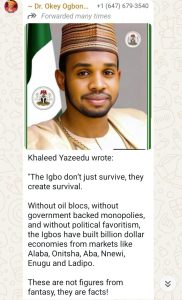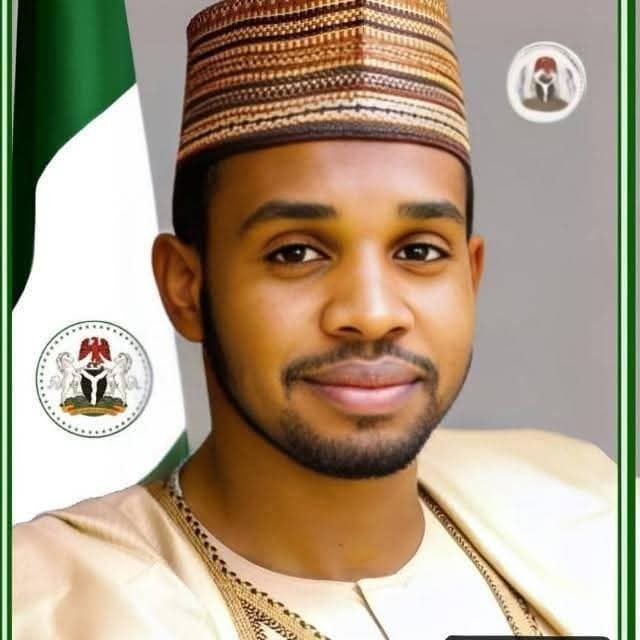A powerful commentary has drawn renewed attention to the entrepreneurial strength and tenacity of the Igbo people in Nigeria’s economy.
Diaspora Digital Media (DDM) reports that writer and commentator Khaleed Yazeedu has spotlighted in a social media message what he describes as the “economic miracle” of the Igbo people, achieved despite decades of systemic exclusion and lack of state-sponsored support.
According to Yazeedu, the Igbo have built billion-dollar economies in markets and cities such as Alaba, Onitsha, Aba, Nnewi, Enugu, and Ladipo, without access to oil blocs, government-backed monopolies, or political favoritism.
He emphasized that these achievements are not speculative but are grounded in verifiable commercial success.
Yazeedu remarked that while many regions in Nigeria rely on monthly federal allocations, the Igbo man wakes up each day with a plan, builds a path, and creates solutions that feed the nation.
He said this level of self-reliance supports not just families but entire supply chains across the country, contributing significantly to national commerce and survival.
Despite these contributions, Yazeedu lamented that the Igbo are often met with suspicion instead of gratitude.
He noted that rather than being recognized as partners in progress, the Igbo frequently face persecution and institutional discrimination.
According to him, this marginalization has endured despite the painful history of pogroms, civil war, and years of post-war exclusion and economic hardship.
Still, the Igbo people continue to rise, powered by innovation, resilience, and unmatched commercial instincts.
“If Nigeria were fair,” Yazeedu wrote, “the Igbo would be celebrated as a backbone, not treated like a burden.”
He criticized the prevailing attitude that expects a group who rebuilt their lives after genocide to beg for recognition or political inclusion.
Yazeedu issued a stark reminder that Nigeria’s heavy dependence on crude oil is unsustainable and vulnerable to global shocks.
He contrasted this with the Igbo model of self-sufficiency, which thrives independently of federal allocations or external support.
His message carried a clear warning: Nigeria must seriously consider the consequences of alienating those who power its economic engine.
He questioned what would remain of the nation’s economy if the Igbo ever decided to walk away from the union.
He stressed that his words were not a threat but a caution rooted in economic realism.
“A nation cannot afford to keep pushing away those who hold its economic pulse in their hands,” he warned.
Yazeedu’s remarks have sparked intense discussions online, particularly among Nigerians who believe that unity must be built on mutual respect and economic justice.
Many social media users echoed the sentiment that the Igbo should be embraced as key stakeholders in Nigeria’s future, rather than sidelined in political appointments and national discourse.
Historically, the Igbo ethnic group has been one of Nigeria’s most industrious and widely dispersed, dominating trade and manufacturing hubs across the country.
Their economic influence spans electronics, spare parts, textiles, building materials, logistics, and more, thriving both locally and internationally.
The post-war period saw the Igbo bounce back from economic devastation, including the controversial £20 policy that wiped out their bank savings, regardless of prior wealth.
Since then, they have transformed marginalization into motivation, exporting business acumen from Southeastern Nigeria to markets across West Africa, Europe, and North America.
Yet, political representation and federal investment in the Southeast remain limited, and infrastructure continues to lag behind national standards.
This imbalance has fueled growing agitation and secessionist movements, with many calling for restructuring or outright independence.
Yazeedu’s piece, while not advocating secession, implies that continued neglect could accelerate such sentiments.
Analysts argue that reconciliation with the Southeast must go beyond tokenism and be rooted in equity, inclusion, and strategic investment.
They caution that ignoring the legitimate demands of the Igbo risks further destabilizing the fragile unity of Nigeria.
As the country grapples with economic uncertainty and insecurity, voices like Yazeedu’s are urging national leaders to recognize and respect the people who drive Nigeria’s economy.








